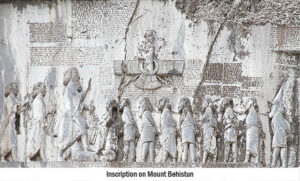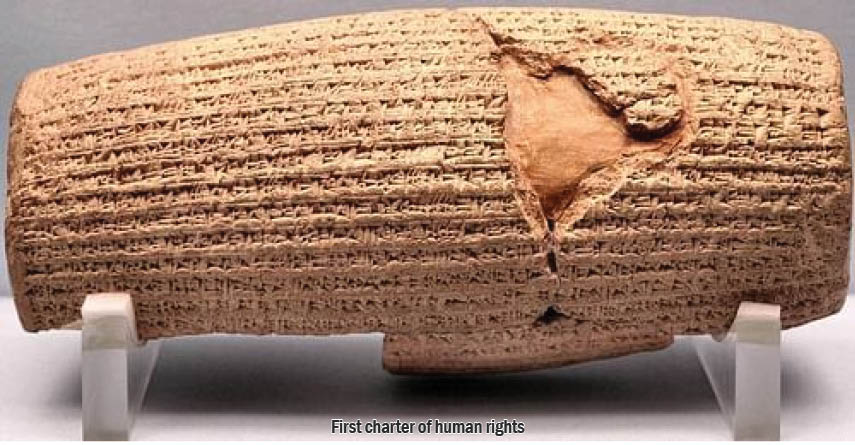Ask an average Zoroastrian the fundamental ethos of his/her religion and it is likely that he or she would say, “Humata, Hukata, Huvrashta” or good thoughts, good words and good deeds. However, the fundamental ethos of the religion does not require three words, just one would suffice… and that would be ‘Asha’.
Asha, which is variously translated as ‘truth’, ‘righteousness’ and ‘(divine) order’ is the principle on which the religion of Zarathushtra is based.

How Cyrus The Great Established ‘Asha’ or Order…
The Achaemenians did not just pay lip service to the principle of Asha, they actually put it into practice. More than two and half millennia ago, Kurush II (more popularly known as Cyrus the Great) laid the foundation of the Achaemenian dynasty. Born in 599 BC, Cyrus is referred to by scholars and historians as, “the most outstanding person of the ancient world,” and the architect of the first ‘World Empire’. Despite the vastness of his empire and the strength of his army, Cyrus remained a benevolent and tolerant King.
In an age seeped in cruelty, slavery and the law of ‘might is right’, he gave humanity the First Charter Of Human Rights declaring, among other rights and freedoms, man’s right to freedom of religion, creed, opinion, expression and free movement. This was establishing Asha or Order.
Cyrus ruled justly and benevolently. The law of the Persians and the Medes came to be known as immutable laws and applicable equally to the rich and poor, royalty and commoner! Cyrus the Great did not just talk about Asha, he lived it, in thought, word and deed!
 Darius The Great Ruled With Asha…
Darius The Great Ruled With Asha…
Darius the Great, whose empire extended from the river Indus to the river Danube, was yet another believer and practitioner of Asha.
In his famous Behistun inscription he wrote: “All that I have done is by the grace of Ahura Mazda and is witness that it is true and not lies; all of it I indeed have done. By the Grace of Ahura Mazda, I did much more, which is not graven in this inscription. On this account it has not been inscribed lest he who shall read this inscription hereafter should then hold that which has been done by me to be excessive and not believe it and takes it to be lies. On this account Ahura Mazda brought me help, because I was not wicked, nor was I a liar, nor was I a despot, neither I nor any of my family. I have ruled according to righteousness. Neither to the weak nor to the powerful did I do wrong.”
Darius the Great proudly proclaimed that he ruled according to principle of Asha or righteousness and dedicated all that he achieved to the Grace of Ahura Mazda.
Xerxes – The Friend Of Truth…
Xerxes is the Greek version of the Persian name Khshayarsha. He was the son of Darius the Great and Atossa, the daughter of Cyrus the Great.
A stone tablet with one of the most famous inscriptions of Xerxes the Great is preserved to this date, in the Museum at Persepolis. The inscription states, “A great God is Ahura Mazda, who created excellent work which is seen, who created happiness for man, who bestowed wisdom and activity upon Xerxes the King. By the favour of Ahura Mazda, I am of such a sort that I am a friend to the right. I am not a friend to the wrong. It is not my desire that the weak man should have wrong done to him by the mighty, nor is that my desire that the mighty man should have wrong done to him by the weak. What is Right is my desire. I am not a friend to the man who is a lie follower.
In another inscription found at Persepolis, Xerxes states, “By the favor of Ahura Mazda, these are the countries of which I was king apart from Persia. I had lordship over them. They bore me tribute. What was said to them by me, that they did. My law, that held them: Media, Elam, Arachosia, Armenia, Drangiana, Parthia, Aria, Bactria, Sogdiana, Chorasmia, Babylonia, Assyria, Sattagydia, Lydia, Egypt, Yaunâ, Maka, Arabia, Gandara, India, Cappadocia, Dahae, Sacae, Thrace, Âkaufaciyâ, Libya, Carian, Nubian. You who may live hereafter, if you should think ‘Happy may I be when living, and when dead may I be blessed,’ have respect for that law which Ahura Mazda has established. Worship Ahura Mazda at the proper time and in the proper manner. The man who has respect for that law which Ahura Mazda has established and worships Ahura Mazda at the proper time and in the proper manner, he both becomes happy while alive and becomes blessed when dead.
Asha Ushers Happiness
Thousands of years before Thomas Jefferson wrote down his famous words, “Life, Liberty and the pursuit of Happiness” in the US Declaration of Independence, Xerxes immortalized mankind’s ‘Right to Happiness’ as divinely given by Ahura Mazda (God). His words can still be found today written in ancient Persian cuneiform script on the walls of Persepolis, “A Great God is Ahura Mazda who created happiness for man.”
- The Feast Of Tirgan - 23 November2024
- Life And Message Of Asho Zarathushtra – II - 16 November2024
- Life And Message Of Asho Zarathushtra –I - 9 November2024
